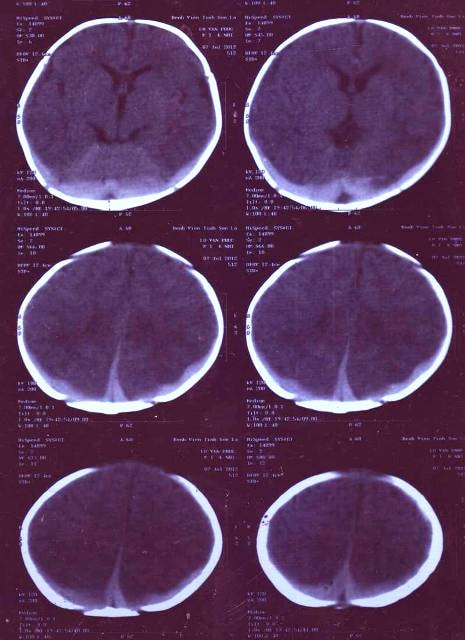Children with vitamin K deficiency are susceptible to cerebral hemorrhage.
Newborns with vitamin K deficiency are at high risk of brain hemorrhage and even death. These cases can be avoided if newborns are vaccinated at birth.
Severe brain damage due to vitamin K deficiency
The Department of Pediatrics, Bach Mai Hospital has just conducted an online pediatric consultation with satellite hospitals to resolve difficult cases. Notably, a 41-day-old patient suffered a severe brain hemorrhage due to not being vaccinated with vitamin K after birth. The patient is Lo Van Phu, Tong Co commune, Thuan Chau district, Son La province.
According to the patient's family, after 1 month of birth, Phu showed signs of refusing to breastfeed and crying out in fits, and was taken to the emergency room at Son La General Hospital. Phu was admitted to the hospital in a lethargic state, with purple lips, blue skin, pale mucous membranes, bulging fontanelle, and stiff neck...

Brain damage on CT scan
Immediately, the doctors prescribed specific medication and conducted some necessary tests, including a CT scan of the brain. The results showed that the bilateral occipital region (under the dura mater), the cerebellar falx, and the superior sagittal sinus had lesions with increased density in the form of blood. The midline was balanced and not compressed, and the sulci, cerebral gyrus, and ventricular system showed no abnormalities. After consultation, the baby was diagnosed with a cerebral-meningeal hemorrhage due to a decrease in prothrombin ratio.
After 8 days of intensive treatment, the child's health has improved, the child is breathing regularly, has pink lips, can breastfeed on his own, the fontanel is not bulging, there is no localized paralysis, and no convulsions. The child's health has now recovered and he has been discharged from the hospital. Doctors said that this is one of many cases of cerebral hemorrhage due to the mother giving birth at home without receiving a vitamin K injection after birth, which has been successfully treated at the hospital. There is currently another case of a child in a similar condition being treated at the hospital.
Vitamin K injection is required immediately after birth.
In an online consultation on this case, Associate Professor, Dr. Nguyen Tien Dung, Head of the Department of Pediatrics, Bach Mai Hospital, said that vitamin K is an important component involved in the blood clotting process, specifically needed for the formation of Prothrombin in the liver. For newborns, vitamin K helps prevent and treat bleeding, prevent anemia and hemorrhage.
According to a 2004 study, brain hemorrhage in children due to vitamin K deficiency had a rate of 142 children/100,000 children not injected with vitamin K in remote mountainous areas and 81 children/100,000 children not injected with vitamin K in the plains. Children with vitamin K deficiency are very susceptible to brain and meningeal hemorrhage, with a high mortality rate.
Symptoms of vitamin K deficiency in infants often occur very early, from the first week after birth to 3 months of age, especially with cerebral hemorrhage, infants often refuse to breastfeed, cry, vomit, accompanied by pale skin, convulsions, lethargy, and coma. If emergency treatment is given promptly, it can also leave serious sequelae because meningeal hemorrhage damages the brain, affecting the nervous system... Common sequelae are epilepsy, motor paralysis, mental retardation, and hydrocephalus, causing lifelong disability in children.
Therefore, experts recommend that it is necessary to inject (intramuscular) vitamin K only once for newborns to avoid brain hemorrhage damage, reducing unwanted sequelae in children. Pregnant women can prevent vitamin K deficiency by eating foods rich in vitamin K such as green vegetables, cereals, milk, chicken eggs, lean pork, beef...
According to Health & Life - NT






